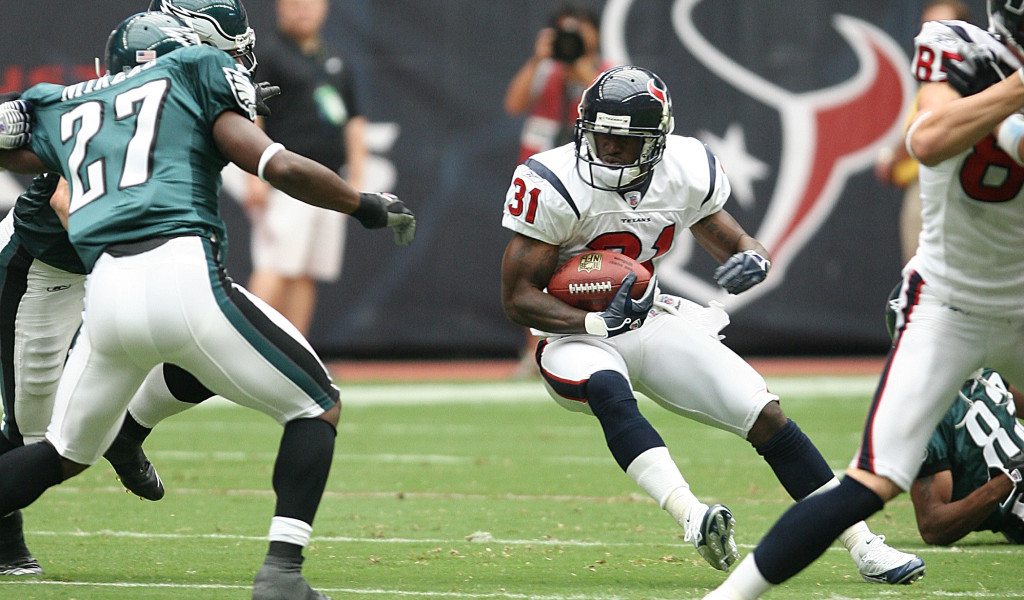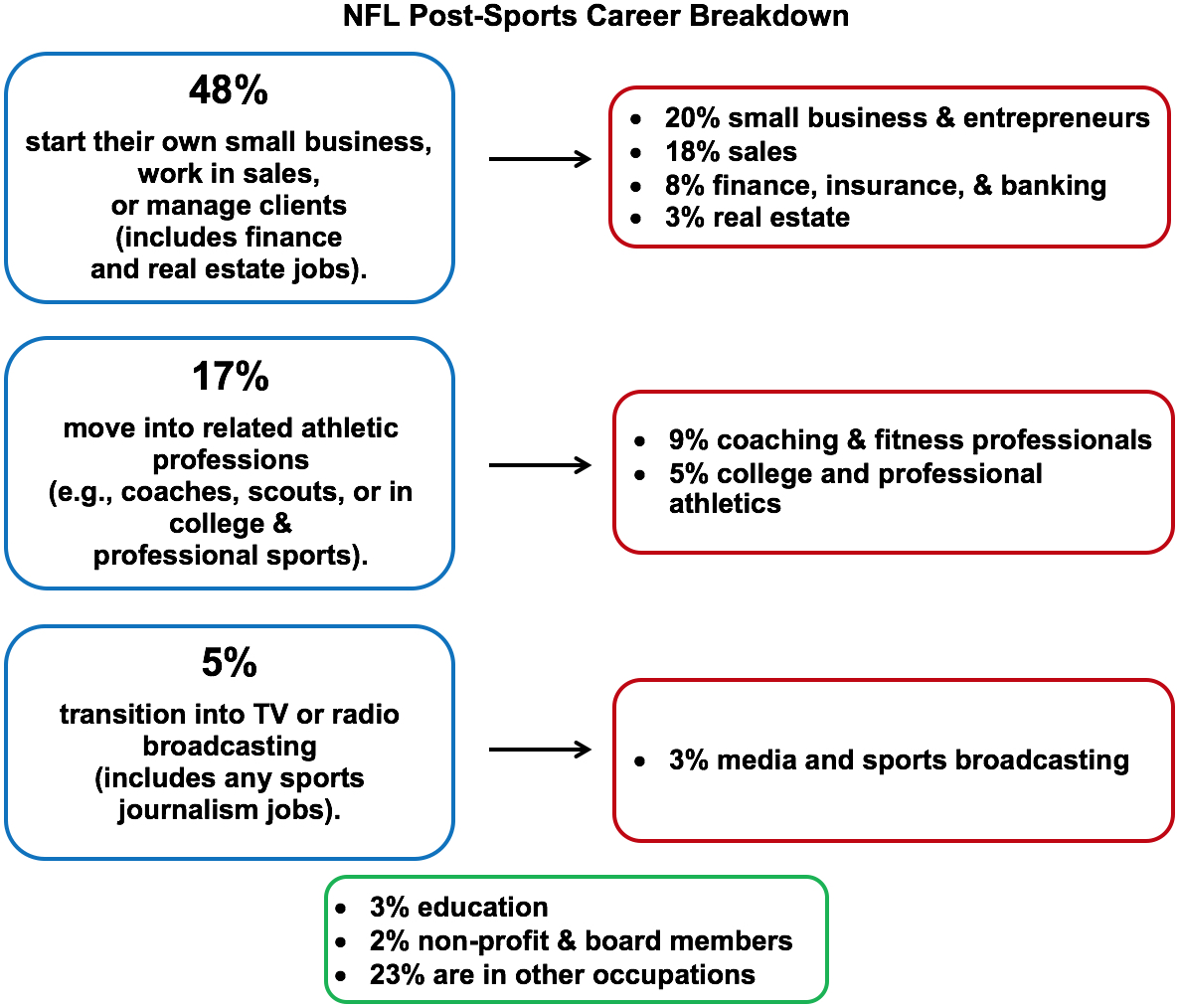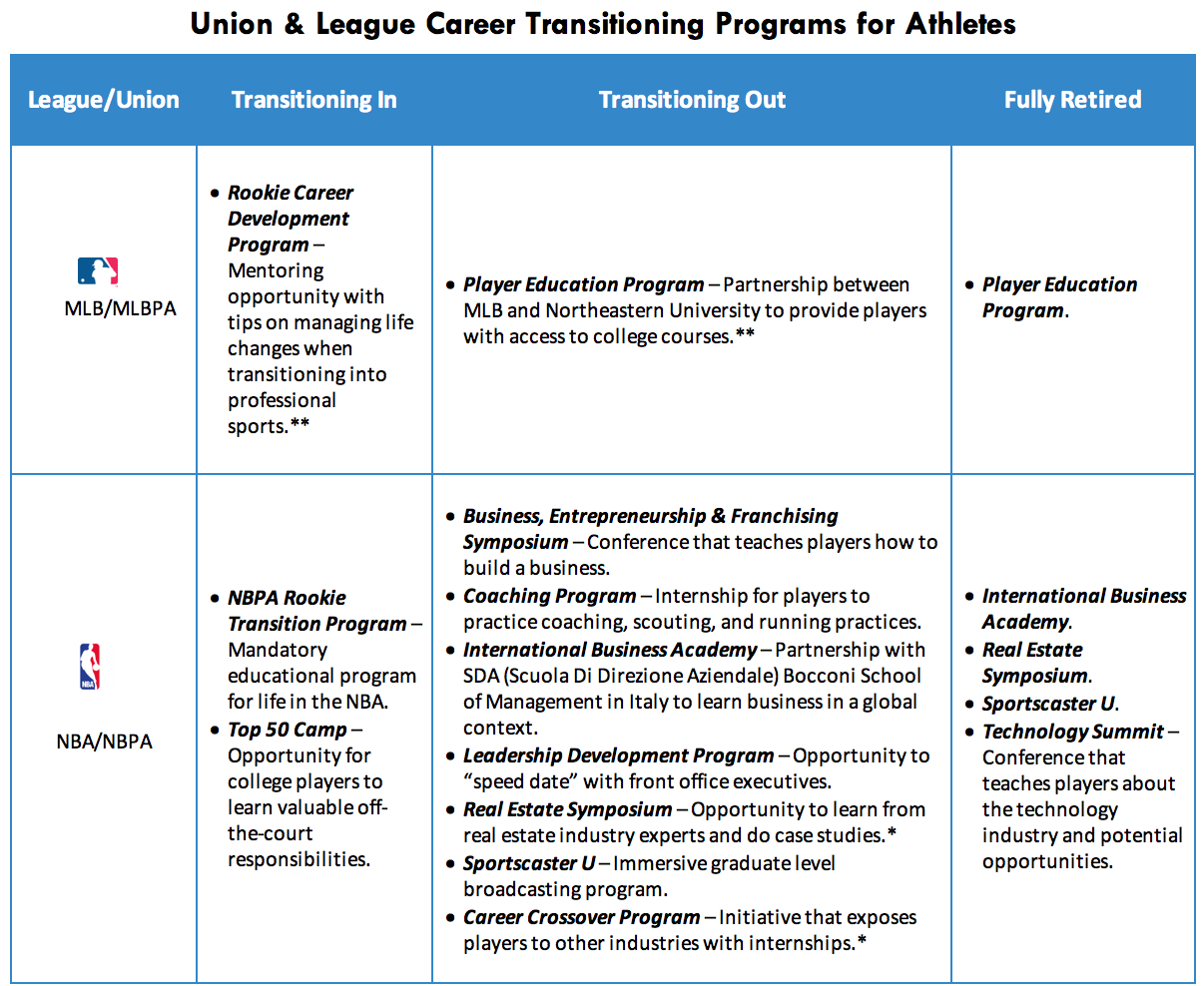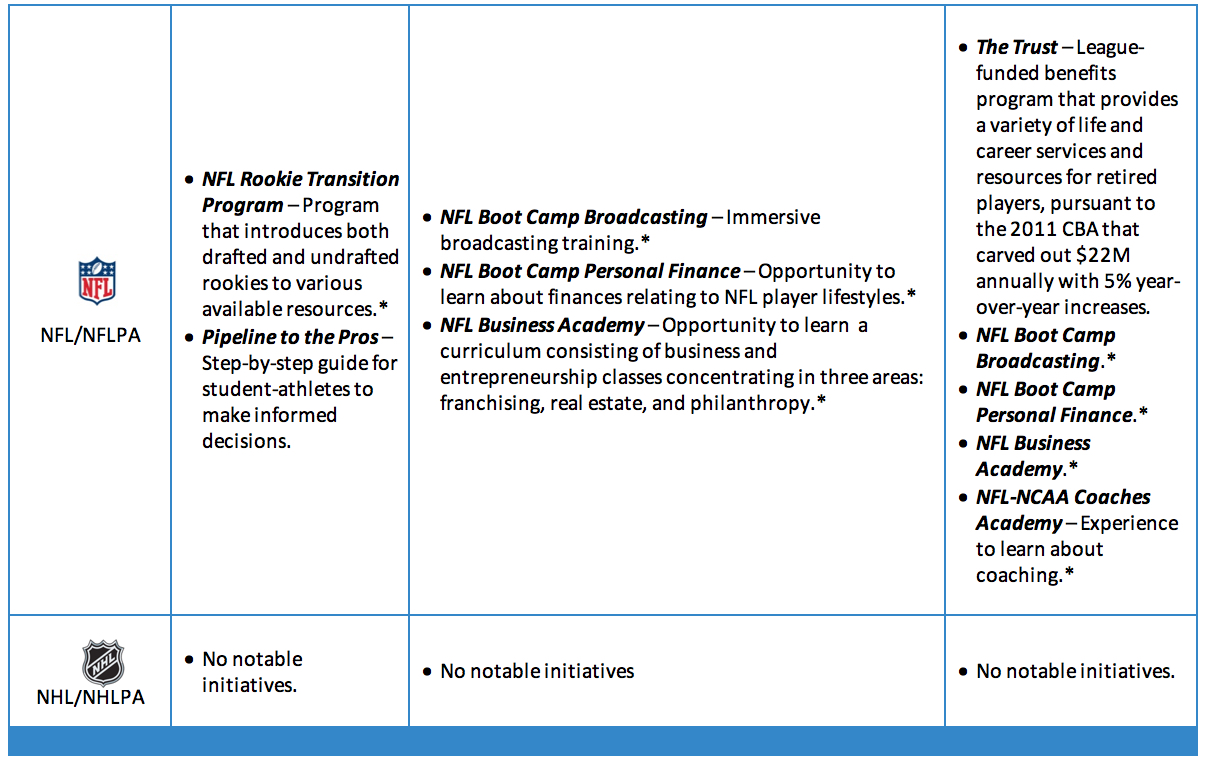Navigating Career Transitions in Pro Sports – Athletes Must Help Themselves Succeed in Retirement

Professional athletes are often strictly focused on advancing in their respective sport. However, they should be just as concerned, if not more, with their long-term professional development off the field. Athletes make millions of dollars in a short period of time, but going broke is a real possibility without the right guidance.
The transition into the league is nearly as critical as the transition out of it. Rookies in the four major professional sports are often only a few years removed from graduating high school. Young age, an intense focus on athletics, and minimal exposure to managing finances often result in professional athletes that are ill-equipped to sustain long-term wealth on their own.
Once their athletic career is winding down, they are often at a loss for what to do next. Leagues and unions have put some measures in place to address this issue, but they tend to be inadequate. The transition can be brutal – resulting in many floundering and directionless athletes.
Size Does Matter – Programs Aren’t Big Enough
Thinking about life after sports can be daunting, and the reality of the situation can be even more intimidating. Each athlete is primarily on his own when navigating career transitions. In theory, the ideas and programs that leagues and unions have created sound great. However, there are a few initial problems that immediately impact how effective these programs can be.
Depending on the sport and initiative, their size is often limited to only a handful of players. Also, many of the programs are not ongoing, but rather a few days long in the form of a boot camp with minimal follow up, if any. For some efforts that do exist, sometimes the athletes are ill-informed and unaware of the available program opportunities. Given these limitations, what is currently available is less effective in supporting smooth transitions into and out of the league for all athletes.
For example, the National Basketball Players Association’s (NBPA) Sportscaster U program exposes athletes to the broadcasting industry with television and radio segments and production meetings. This symposium, which lasts only four days, couples an athlete’s unique perspective on the game with the requisite skills to effectively communicate through multiple types of media. However, only a select few players are able to participate each year since space is limited. Besides, not everyone can be the next Michael Strahan since Strahan is already filling that role for ABC. So while we may see many retired athletes discussing sports on television, only the chosen few will be able to pursue this career option. These types of programs need to be expanded and better marketed so that their positive effect is more widespread and impacts more players.
They also need to cover broader career options since most retired athletes pursue careers outside of the sports industry – like former National Football League (NFL) players, noted in the chart below.

Source: LinkedIn (2017)
Other programs that are great for preparing players for life during and after sports, but do not involve enough players, are the NBPA’s Real Estate Symposium, and Major League Baseball’s (MLB) and the Major League Baseball Players Association’s (MLBPA) Rookie Career Development Program. The Real Estate Symposium is an immersive experience for players to hear from successful real estate moguls and participate in mock case studies. The Rookie Career Development Program is the primary transition program for MLB prospects entering the league, giving them tips on how to handle the life changes they are about to experience as professional athletes. Meanwhile, neither the National Hockey League (NHL) nor the National Hockey League Players’ Association (NHLPA) provides any notable player programs to aid the transition of players into and out of the league.
The resources available for a player can change based on the sport. However, the bottom line is that athletes are primarily on their own at the end of the day. Access to these programs is key, as is complementing them with strategic planning and ongoing guidance for a successful life off the field.
Never Fear to Negotiate for Career Transition Initiatives – The Power of the CBA
Making it to the professional level is an empowering achievement – but with the fame, money, and glamor comes great responsibility to both themselves and their families. Athletes need to keep their finances secure and give themselves a purpose in all that they do – both during and after their athletic careers. They have the ability to change their leagues and unions by collectively advocating for initiatives they believe will help them in the present and future.
Through collective bargaining, unions protect the players’ rights from the league. Unions have already made great progress fighting for higher salaries, revenue share, guaranteed money, and benefits, but athletes can negotiate and petition any league official, owner, or union representative to implement and push for effective policies and contract provisions that will provide life-long prosperity (i.e., more career development programs and funding from leagues). As a group, they should encourage their union to negotiate for more and better transition initiatives, and the funding to implement them.
A prime example of a career development program and broader transition services negotiated by a union with the league is the National Football League Players Association’s (NFLPA) former player benefits initiative (i.e., The Trust). Under its collective bargaining agreement (CBA), the NFL is required to fund programs that inform former NFL players on finances, business opportunities, and nutrition. In the 2011 CBA, the NFL and NFLPA agreed to $22 million in annual funding to support programs for retired players in addition to 5% increases to that amount every year thereafter. With this funding, The Trust provides former players with career counseling and services, funding to return to school, and healthcare benefits. Among its services, The Trust aids athletes in entrepreneurship, personal financial planning, running their own philanthropic organizations, and maintaining physical and mental health – making it one of the better programs out there, if not the best.
In their CBA, the MLB and MLBPA also negotiated an educational partnership with Northeastern University. Since the players and unions took the initiative to negotiate these provisions, baseball players are now entitled to take undergraduate and graduate courses during and after their playing careers.
With rising salaries and revenue coming from the increasing popularity of sports, there is more money in sports now than ever before. This raises the stakes of CBA negotiations, making it vital that athletes are at the forefront of ensuring that they receive a fair share of this pot. The right strategy and execution can make advancements for career transitioning initiatives possible. The programs and funding that football and baseball players have negotiated for themselves will improve the chances that retired NFL and MLB professional athletes can earn a lifetime of financial security.
However, it is each player’s personal responsibility to utilize available programs and fight for more. This begins with athletes not only taking initiative to push for comprehensive league and union programs and collectively advocating for strong player representatives in the unions, but also recognizing what additional steps they need to take individually to succeed off the field.


* Indicates that the program is a league and not players’ union initiative.
** Indicates that the program is a joint initiative by the league and union.
Sources: Business Insider (2016), Fox Sports (2017), MLB/MLBPA Rookie Career Development Program (2017), NBPA Career Development Programs (2017), NBPA Leadership Development Program (2016), NBPA Rookie Transition Program (2015), NBPA Top 50 Camp (2017), NFL Broadcasting Boot camp (2017), NFL Business Academy (2017), NFL CBA (2011), NFL Personal Finance Boot camp (2017), NFL-NCAA Coaches Academy (2016), NFL Rookie Transition Program (2017), NFLPA (2017), NFLPA Pipeline To the Pros (2017), NFLPA The Trust (2017), NHLPA Charity Initiatives (2017), Hockey for Haiti (2010), Vice Sports (2016)
Athletes Need Long-Term Career Guidance
Leagues and unions have mildly recognized through introductory actions that athletes cannot be left alone to strategically plan their lives after sports. Initial steps to educate, prepare, and transition players have been taken. However, these programs are limited in scope. An external advisor is critical for helping retiring athletes develop an individualized plan to strategically leverage athletes’ wealth, access to capital, network, and any league or union programs for a smoother career transition and softer landing in life out of the game.
Athletes constantly report feeling lost after retiring – a product of preparing their whole lives for a professional career that often lasts a mere five years in “the pros.” The result is mental health troubles and athletes who are entitled to retirement benefits that are limited in sum, age eligibility, and years of play. With careers usually ending before an athlete turns 30 years old, many are left with no plans and less money than they would have ever expected when entering professional sports.
For individuals who have thrived in an environment that is goal-oriented, this can be devastating. Athletes need a purpose in retirement so that they feel fulfilled and can provide for their families financially. The issue with many athletes is that they neglect planning before it is too late. They often fail to understand the skills and strategy they should develop for a second career, and the transferable skills they already possess from playing professional sports.
Guidance is essential for these reasons. Having an in-depth discussion about life after sports and how they can use their athletic careers to their advantage in retirement would benefit athletes at any stage of their careers. However, to be most effective, they should begin planning for their retirement while still in the game – when people will still return their phone calls, they have more leverage, and they are still “hot.”
Final Thoughts
Having watched numerous former pros fall off physically, mentally, and financially, athletes need to step up and take some personal responsibility. This starts with being proactive. Leagues and unions that have long ignored or provided ineffective programs for their players have started to take steps in the right direction. Nevertheless, these new initiatives do not go far enough for their players. While more uniform and complete league and union efforts are necessary to successfully transition players, athletes need to be active in driving their own career transitions and expanding programs available to them. Otherwise, the system will remain mired in half-efforts that lack player input and participation.
In addition to fighting for their rights in the CBA, athletes need to take career transition as seriously as they take developing their skills on the field. Just like how they hire trainers and nutritionists to hone their physical fitness, athletes should know that they need strategic career advisors like The Azara Group. We can help them develop career transition plans and the skills that will increase their financial fitness and post-sports career prospects.
Not only have unions and leagues of the four major professional sports fallen short in this area, but sports agencies also lack these services. They focus on maximizing player income, media exposure, and providing personal branding services. The Azara Group fills this void. We want athletes to avoid becoming part of the infamous statistics highlighting athlete bankruptcy and ruin. Most athletes lack the star power and brand value that carry some in life after retirement. Most end up joining the traditional workforce, but often lack the skills, work experience, network, and strategic career planning that the average person has spent years cultivating and developing through job experience in Corporate America.
We not only help with strategic career planning, but also with developing leadership and negotiation skills in athletes. We also are interested in helping them effectively utilize and expand their existing network, as well as leveraging their transferable skills from sports to help them pursue their passions in any field, sports-related or not. We want to help athletes utilize available programs effectively, but we also want to assist them in planning for retirement and their second careers strategically.
The Azara Group (TAG) is a consulting firm that promotes the development of leaders in an increasingly competitive and diverse marketplace – providing strategy consulting services and leadership training services to advance professional and life success. TAG leverages expertise in career strategy, diversity, negotiation skills, and business acumen to provide strategic advice and consulting services to help people and organizations get what they want, achieve their goals, and advance their business and career objectives. TAG also helps companies better attract, retain, and promote diverse talent, and develop robust diversity platforms and strategies to create a more inclusive workplace.
The Azara Group welcomes your direct comments and feedback. We do not post comments to our site at this time, but we value hearing from our readers. We invite you to share your thoughts with us. You can contact us directly at info@theazaragroup.com.
 The Azara Group
The Azara Group